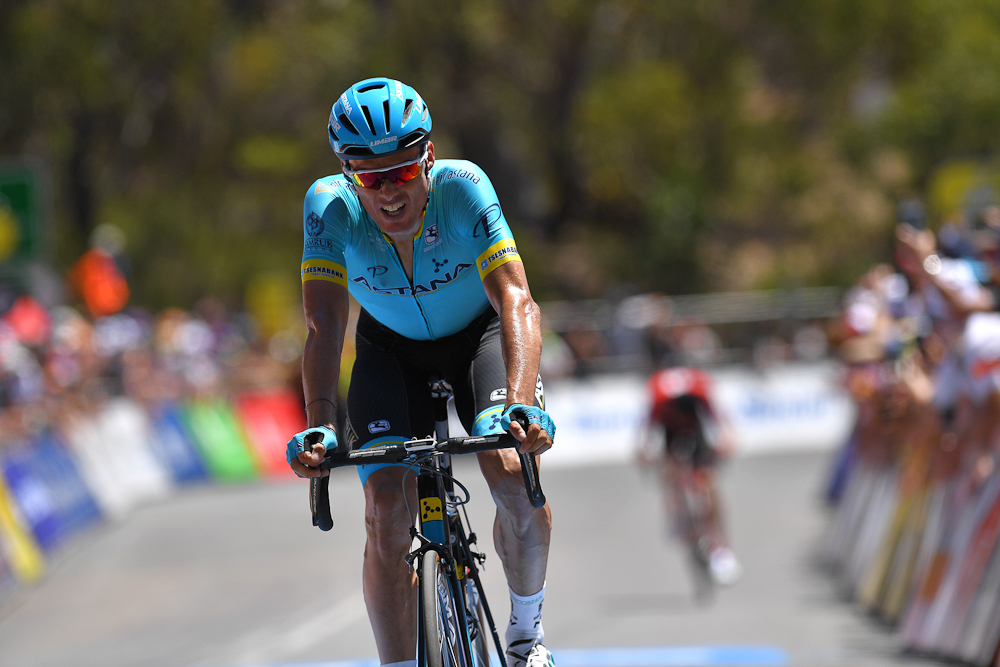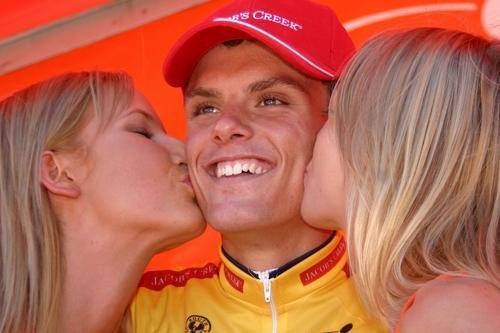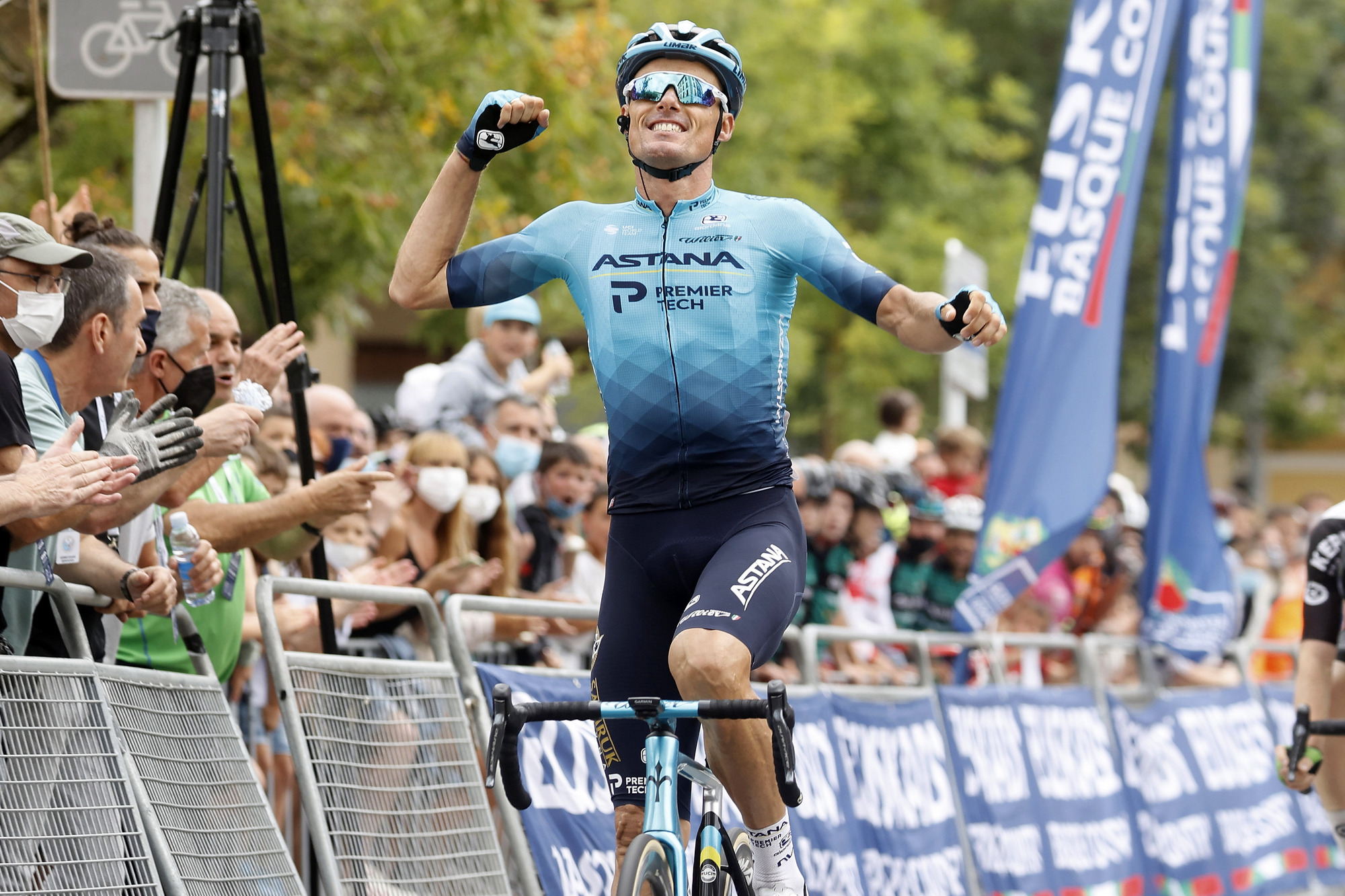Luis León Sánchez: at my age you're worse at some things but better at others
Oldest active Tour Down Under winner back for Australian debut in 20th pro season

Buried somewhere deep in the archives of Cyclingnews, there’s an article about a 21-year-old rider claiming his first ever stage race at the 2005 Tour Down Under and how, as the article puts it, Spain’s Luis León Sánchez “has shown that he is the early bird of this season and also possibly a great name for the future.”
Sánchez claimed the 2005 Jacob’s Creek Tour Down Under, as Australia's premier event was branded back then, by winning a mid-race stage in which a 26-strong group pulled out a staggering 30-minute gap on the rest of the peloton. That was quite a statement in itself, but the young Spanish racer earned himself even more compliments as he stayed in control of the TDU lead all the way through to the final criterium stage in Adelaide, won by a certain Robbie McEwen.
Fast forward 18 years and while McEwen and the vast majority of the 2005 peloton have long since hung up their wheels, Sánchez is limbering up for his 20th season in the peloton with a return to the Tour Down Under.
Since 2005, too, Sánchez has racked up a total of nearly 50 wins, including four stages of the Tour de France, an overall of Paris-Nice in 2009 when he outwitted no less a rival than Alberto Contador in his prime, and two victories in the Clásica San Sebastian. Last year when with Bahrain Victorious he didn’t get a win, but he came mighty close on one stage of the Tour de France and added fresh top 20 finishes overall in both the Tour and the Vuelta to his already lengthy palmarès.
Quite apart from heading back to the Tour Down Under, where Sánchez holds the record for participation among currently active riders – 12 – 2023 also marks a return for Sánchez from Bahrain Victorious to Astana Qazaqstan, his team of seven years standing. Simultaneously, he’s now entering his third decade as a professional.
“It’s true that when I turned pro [in 2004] I didn’t think I’d be doing this for so long. Now I’m 39, but I’m still motivated, still training as much as when I was young and that’s what keeps me going in the peloton,” Sánchez told Cyclingnews during the off-season.
“My level is still good and my family is still supporting me a great deal. I do miss my family a lot when I'm away, but I’ve always been a racer ever since they knew me and they are sports fans too. So while I can, I’m going to keep going.”
Get The Leadout Newsletter
The latest race content, interviews, features, reviews and expert buying guides, direct to your inbox!
From the outside, it’d be easy to draw certain parallels between Sánchez and Vincenzo Nibali, who returned to Astana Qazaqstan, his team for many years, for a swansong season in 2022. But despite having signed for one year, as Nibali did, Sánchez denies that he will definitely be pulling down the curtain at the end of 2023.
“It’s true that the youngest generation of racers is now performing at incredible levels, they’re even winning Grand Tours from the word go,” Sánchez says. “But I’m not thinking ‘ok, let’s give it another year and then stop’. That’s not in my mind.
“When I signed with Astana we first talked about a contract for two years, then we talked about one year, then we talked about one year and an option on another... my idea, for now, is to do this year at least and hopefully a few more."
"But for now I'm thinking about 2023, and I want to be competitive, contribute to the team and basically see how things unfold.”

When riders return to teams they have previously left, it invariably begs both the question of what took them away in the first place and why they think the second time will work out better.
But Sánchez says that he was far from alone in wanting out from Astana at the end of 2021, as a brief but bitter management power struggle saw longstanding team boss Alexander Vinokourov briefly removed from that role.
By the time Vinokourov had regained control at Astana in the autumn, the Kazakhstani was too late to prevent what Sánchez frankly describes as a “bit of a mass stampede for the door”, with 16 riders already opting for other squads. That included Sánchez.
“It was my decision to go. Vinokourov was not there [in Astana], the team’s situation was complicated and there was a bit of a mass stampede for the door because of the uncertainty,” Sánchez says.
“Then Vinokourov came back after the Vuelta and he talked to me about re-signing. I refused because I’d already got my contract with Bahrain for 2022.”
“However, I wasn’t particularly happy or comfortable at Bahrain, so I talked it through with them. We reached a reasonably good agreement because I’m not at an age when I can afford to waste time or ask them to waste it either.”
“Then the call from Vinokourov came through, he asked if I was free and said that he’d make a [financial] effort to ensure I could come back. And that all worked out.”
"Those seven years I spent here were very good ones and we were, in inverted commas ‘a family.’ It’s just unfortunate that whereas there were a lot of Spaniards on the team before, now there are far fewer.”
“But I know all the management, I know where to go if I need something special for my bike or who to contact if I need to make a last-minute change to travel plans. I'm very much at ease here.”
Where now for Astana Qazaqstan?
If Sánchez has moved back to Astana Qazaqstan, it was to find that the team had moved on. When Sánchez spoke to Cyclingnews, the possible signing of Mark Cavendish had yet to be confirmed or denied. But what was clear was that the mass exodus of riders at the end of 2021, and the very poor year Astana had in 2022, were both still having a considerable knock-on effect on how the team was planning out 2023.
Sánchez argues that with the exit of 16 riders in one fell swoop, including such leading lights as himself, the Izagirre brothers, Jakob Fuglsang and Aleksandr Vlasov, there was bound to be an adaptation period afterwards. But it's not just Astana Qazaqstan who are seeing the goalposts change: Sánchez also says that the continuing rise of the ‘super-team’ in the WorldTour has left all the middle-to-lower ranking squads feeling an even greater need to adapt.
“You have to look at how we were at the end of 2021, when it was all yes, no, lots of uncertainty, was the team going to end and finally so many riders left. The team had to reinvent itself and sign a heck of a lot of people and it seemed like a new squad.”
“When that happens in a team, you have to give it a bit of time, things need to take a space to get up and running. And Astana have had a difficult year in 2022, fewer victories than they had hoped for or been used to getting.”
“In 2023, we have to accept that we aren’t winning or fighting for the Grand Tours anymore, with guys like [Fabio] Aru or Nibali or Mikel Landa. So that calls for more reinvention and the team has to be competitive from the word go, because a lot of the biggest stage races are now going to the biggest teams with the biggest budgets.”
Warming to his point, he cites UAE Team Emirates as an example. “When they’re signing riders like Adam Yates or [Marc] Soler or Rafał Majka to ride for [Tadej] Pogačar, we’re talking about riders who have been leaders in other teams.”
“To fight against that is very hard. So we have to fight for stage wins or the overall of smaller races. There are no other options on the table.”

Quite apart from Cavendish being a perfect fit for those types of objectives – assuming it is finally confirmed he signs for Astana – breakaway specialists like Sánchez are also more than handy signings for the team in its new shape. And in Sánchez' case at least, age doesn’t seem to be affecting his performances too badly either: he was in on three major breaks during the 2022 Tour, snatching third at one summit finish in Morzine. All this en route to 13th place overall and a handy haul of UCI points for the squad.
Sánchez confirms that he’d hoped to get "a fifth Tour de France stage, because my last one was in 2012. But just fighting for a Tour stage was really great. It was a big boost to my morale, a reminder that it’s worth the sacrifices I make, for the rewards I can still get.”
Even without an actual win, he says, just doing so well in the Tour “motivated me to keep racing. I found a new kind of personal and physical stability which told me something too.”
“I don’t recover as well as when I was young, the young guys recover so fast now. But at my age, you're worse at some things but better than others, like that continuity which I didn’t have in other years. What you have to do is strike a balance, fight for some stages and see if you get lucky, but keep in mind that it’s hard to win anywhere these days.”
For Sánchez, his ultra-veteran status means he’s at a point where he’s no longer needing to make more than “a very few changes" each year.
"I know I’m not going to tell myself to wait for the Tour or Vuelta to try and go at 100 per cent. I’m lucky enough to live in Murcia where the weather is good for cycling, but unfortunately not so good for the general population because we need more rain. So I always start the season well. And even if I’m not in top form, I can use that.”
The other reason for Sánchez wanting to get good results as soon as possible, he says, is relatively new, but it doesn’t just affect cycling. As he, and many other riders, see it, the COVID-19 pandemic has “changed us all, and for the trainers and managers, it’s still very hard to make plans for an entire season."
“We’ve all got families, we can’t just sit in a room and never be with anybody else. So nobody’s risk-free and we’ve got to accept that."
"That also means whatever kind of victory there is out there on the table, we have to grab it. Because as soon the season starts, anything can happen. There's even talk now about the ‘flu virus being on its way back. But I'd say there are so many viruses out there right now, we don’t really know how many viruses there actually are.”
One other factor that has changed significantly in 2023 for Sánchez and Spanish cycling, too, is the absence of Alejandro Valverde – like Sánchez, from the south-easterly region of Murcia.
Valverde’s departure marks a new chapter in the sport, Sanchez says, but at an international level, not just back home in the province nicknamed, thanks to its flourishing agriculture, 'the vegetable garden of Spain.'
“There are few riders who can impact on racing from the first day of the Mallorca Challenge to Il Lombardia or win ten to twelve races a year, but Alejandro was one of them. His departure is a real changing of the guard. Retirement comes to us all, but Alejandro was a reference point, and we’re all going to miss him.”
Yet it’s also fair to say that Sánchez himself has become something of a reference point for successful veteranship in the sport as well. Because from the 2023 Tour Down Under to the Vuelta a España – where stage 9 passes through his home region of Murcia and on many of his home training roads, as Sánchez surely has noted – Sánchez will be looking to put Astana Qazaqstan on the cycling map again. At nearly 40, that's no mean achievement.
Alasdair Fotheringham has been reporting on cycling since 1991. He has covered every Tour de France since 1992 bar one, as well as numerous other bike races of all shapes and sizes, ranging from the Olympic Games in 2008 to the now sadly defunct Subida a Urkiola hill climb in Spain. As well as working for Cyclingnews, he has also written for The Independent, The Guardian, ProCycling, The Express and Reuters.
